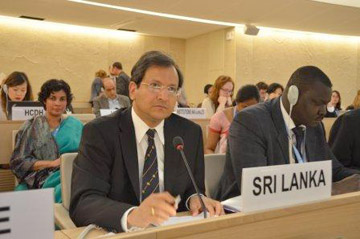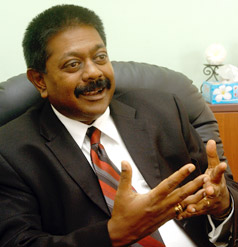Much progress in post-terrorism reconciliation
By Manjula Fernando
Sri Lanka's Ambassador in Geneva, Ravinatha Aryasinha castigated the
actions of the proponents of the negative resolution on Sri Lanka at the
UN HRC sessions on Friday, saying the resolution on Sri Lanka violated
the constitution of the country.
 |
|
Ambassador Ravinatha
Aryasinha at the UNHRC sessions |
Intervening at the first informal meeting called by the co-sponsors
of the resolution on the fifth day of the sessions, Aryasinha said the
draft resolution ‘violates the constitutional provisions’ of Sri Lanka,
it is ‘highly intrusive’ in nature and is in ‘breach of sovereignty’ of
the Sri Lankan people and the ‘territorial integrity’ of Sri Lanka.
He said when Sri Lanka has shown so much progress in the
post-terrorism reconciliation process, “the obsession shown by some, in
their call for action on Sri Lanka, lays naked their own sinister
motives, that is to appease pro-LTTE Tamil constituencies, for
collateral electoral political gain.”
Political imperatives
The Ambassador said the intention of presenting yet another
resolution on Sri Lanka in the Council was made known by the US to the
Sri Lankan Government in January this year, long before the High
Commissioner’s Report was made available.
“This made it clear that the process and the intent to do so were led
by political imperatives, rather than an objective assessment of the
situation on the ground,” he said.
He warned that the actions by certain members of the UN HRC, hinders
the reconciliation process underway and contravenes the rules of
procedure and the method of engagement that guides the Council.
He also pointed out the draft resolution is an unjustified endeavour
to vest the Office of the High Commissioner with an investigative
mandate, and of monitoring and assessment. By attempting to widen the
mandate of the resolution, the Ambassador said, they have shown their
vested interests and constant shifting of goal posts, to bring down Sri
Lanka.
‘The resolution sets a bad precedent, and can in the medium-to-long
term have an adverse impact on all developing countries in the Council
since it was intrusive, politicised and in clear contravention of
accepted principles of conduct in the Council, Aryasinha said.
Human shield
He said he would like to remind the co-sponsors of the resolution,
US, UK, Macedonia, Montenegro, and Mauritius that Sri Lanka after
emerging from colonialism in 1948, fought a bitter battle with one of
the ruthless terrorist outfits the world has ever seen, the LTTE, for
thirty years until it was crushed in a humanitarian operation in May
2009.
The informal meeting was called by the sponsors of the resolution
outside the main venue of the regular sessions.
Official sources from the External Affairs Ministry said the sponsors
of the resolution could call up to three unofficial meetings to fine
tune the resolution before the final version is tabled at the council
for action.
These meetings are attended by sponsors, the country concerned,
interested parties and observers which include NGOs, and diaspora
groups. Only the co-sponsors and member states will be allowed to speak
at the meeting.
The official said Sri Lanka is expected to call for a debate and a
vote to pass the resolution through a designated proxy, a friendly
country such as Cuba or Pakistan. This is usually done in the last three
days of the session between March 26 to 28. Already many voting members
including South Africa, Russia, China and Pakistan have expressed
unstinting support and backed Sri Lanka at the UNHRC.
However an expert on UN matters said the US has tabled the resolution
on Sri Lanka on the first day itself and the informal meetings could be
just an eye wash to show that they have consulted everyone before the
document was finalized. ‘This is against the usual procedure. Usually
resolutions are tabled two weeks into the session opening.”
He said the witchhunt against Sri Lanka was evident considering that
Human Rights Chief has gone beyond her mandate in the 2013 US
resolution. Both External Affairs Minister Prof. G.L. Peiris and
Ambassador Aryasinha has protested to it in their representations at the
current HRC sessions.
Minister Peiris met the UN Human rights High Commissioner Navi Pillay
on Thursday as is customary for all heads of delegations to the HRC
sessions. He conveyed that a few countries’ ‘highly prejudiced actions’
as well as actions of the Office of the High Commissioner for Human
Rights (OHCHR) to give ‘disproportionate negative attention’ to Sri
Lanka, has made the separatist Tamil elements in Sri Lanka and abroad
uncompromising, making the intensely difficult task of reconciliation in
Sri Lanka, even harder.
He had said it was unfortunate that Sri Lanka has become a “political
football” in the electoral fortunes in some countries.
During the brief meeting, he told the High Commissioner that her
report on Sri Lanka, lack objectivity was one sided and politicised. He
also said that the Government was concerned about the ‘methodology and
sources’ that continue to inform the High Commissioner’s reports and
action on Sri Lanka.
He said this eroded the confidence in the UN system, the HRC and the
OHCHR.
At the opening session, delivering his 20 minute speech, the Minister
outlined what Sri Lanka has achieved during the past five years after
the end of terrorism and sought all members states to be objective in
evaluating Sri Lanka's case.
Rejecting the High Commissioner Pillay's report on Sri Lanka in its
entirety, the Minister said it pays scant regard to the complexities and
local nuances of a sensitive reconciliation process. He said constant
changing of unjustifiable demands have eroded confidence of the people
of Sri Lanka.
He regretted the remarks by the UN Chief Banki Moon welcoming her
report on Sri Lanka stressing that the report, based on questionable and
baseless material including what has been processed outside the UN
framework, only seek to inflict harm on the reconciliation process by
bringing about a polarisation of the Sri Lankan society.
***************
Ambassador Wickremasuriya thanks 11 US senators
 While the US was working at the UN HRC to garner support for their
third consecutive resolution against Sri Lanka the US Senate passed a
resolution recently expressing support for Sri Lanka's internal
reconciliation process. While the US was working at the UN HRC to garner support for their
third consecutive resolution against Sri Lanka the US Senate passed a
resolution recently expressing support for Sri Lanka's internal
reconciliation process.
Sri Lanka's ambassador to US Jaliya Wickremasuriya thanked the eleven
US senators who introduced Resolution 364.
In a letter to the Senators, the Ambassador called the resolution a
positive gesture of goodwill and understanding towards Sri Lanka from
these senior representatives of the American people.
He underscored the facts enumerated in the Resolution such as the
continued peace in the entire country, restoration of democracy and the
concrete steps taken towards reconciliation that represent the true
situation in Sri Lanka.
“I express my gratitude to you for co-sponsoring Senate Resolution
364. This resolution is a fair and balanced one, it reflects the actual
progress made by the Government of Sri Lanka,” Ambassador Wickramasuriya
said in the letter.
He also said that adopting such a positive resolution by US Senators
would certainly be a moral encouragement to continue the process of
healing and reconciliation in Sri Lanka.
Eleven senior Members of the United States Senate introduced the
bipartisan Senate Resolution (S. Res. 364) on February 27 expressing
support for Sri Lanka's internal reconciliation process and the
significant overall progress the country has made since the end of
terrorism five years ago. The Senators also called on the President of
the United States to develop a “comprehensive and well balanced policy
towards Sri Lanka”, supportive of promoting U.S. interests including
respect for human rights, democracy the rule of law as well as taking
onto account the United States economic and security interests.
The Resolution recognises the immense suffering of the Sri Lankan
people caused by 26-year of terrorism, and the genuine aspiration of the
government to prevent any outside force from triggering a re-emergence
of similar situations that are now behind us; but instead look to the
future through enhanced national unity and reconciliation . |

